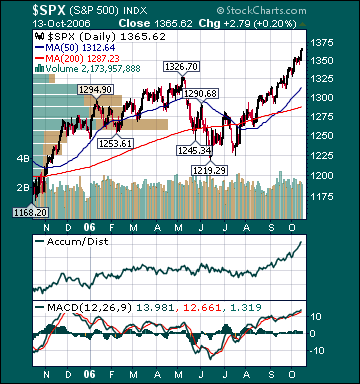Bloomberg:
- The UN Security Council voted 15-0 to adopt a resolution that punishes North Korea for a suspected nuclear-bomb test Oct. 9 and demands that the communist nations not conduct any further tests.
- China’s agreement to vote for a UN resolution punishing North Korea for a suspected nuclear-bomb test is critical to US efforts to halt proliferation, US Secretary of State Condoleezza Rice said. “This is the toughest action that China has ever signed on to vis-à-vis North Korea,” Rice said in an interview on “Fox News Sunday.” “It sends a very strong signal to North Korea that it is now completely isolated. You cannot underestimate how big a blow it is.”
- OPEC will hold an emergency meeting Oct. 19 to discuss a 1 million barrel-a-day output cut, an OPEC delegate said. Qatar said OPEC will take preemptive measures to prevent a price crash.
- Saudi Arabia’s main stock market, the Tadawul All Share Index, has plunged 49% from its February highs.
- Malaysian Prime Minister Abdullah Ahmad Badawi called for greater understanding between Muslims and Western nations. There is nothing in the Koran that condones violence against those who don’t believe in Islam, Abdullah said.
- BP Plc(BP), Europe’s largest oil company, said production at Alaska’s Prudhoe Bay oilfield, the largest in the US, will probably be back to “normal” levels by Monday for the first time since a leak in early August.
- The US dollar advanced against the euro and yen for the third straight week as reports on retail sales and consumer confidence suggest that the US economy is more vibrant than analysts had forecast.
- Goldman Sachs(GS) elevated Thomas Montag to succeed Gary Cohn as head of securities trading in the Americas, the largest unit by revenue at Wall Street’s most-profitable firm.
- Two earthquakes of magnitude 6.3 and 5.8, occurring seven minutes apart, struck Hawaii this morning, the US Geological Survey said.
- Morgan Stanley(MS) says the US dollar will rally in the fourth quarter and investors should be on gains against currencies including the Canadian dollar.
- Samsung Electronics, Asia’s biggest maker of chips, flat screens and mobile phones, reported net income rose to 2.19 trillion won from 1.88 trillion won a year earlier. Analysts had expected net income of 1.9 trillion won.
- Japan’s five-year government notes dropped the most in two weeks after US reports showed retail sales and consumer confidence increased, suggesting exports may support growth in Japan’s economy.
Wall Street Journal:
- Oshkosh Truck Corp.(OSK) agreed to buy JLG Industries(JLG) for about $3 billion in cash. JLG holders will get $28 per share.
Barron’s:
- Merrill Lynch’s(MER) wealth-management division topped the annual Barron’s list of the 40 best private banks by assets with $879 billion in US client accounts.
Minyanville:
- Bernie Schaeffer, of Schaeffer’s Investment Research, thinks the S&P 500 could rally another 15% before year-end.
NY Times:
- Microsoft CEO Ballmer expects most software to be distributed through the Internet in the future.
- Iraqi Interior Minister Jawad al-Bolani intends to purge the ministry’s top commanders to remove the influence of Muslim sects and stem killings by Shiite Muslims.
AP:
- Former Democratic US Representative Gerry Studds, who was censured by the House for his relationship with a 17-year-old male page, died in Boston over the weekend at the age of 69.
NY Post:
- Democratic NY Representative Charles Rangel plans to examine the NCAA’s tax-free status next year.
Crain’s Chicago Business:
- Wal-Mart Stores(WMT) presented the city of Chicago with five sites in predominately black neighborhoods where it would like to build supercenters.
Financial Times:
- London house prices have risen nearly 10% in the past year, driving up the value of property throughout England and Wales, citing the FT house price index.
AFP:
- Iraq has resumed the export of crude oil from the northern part of the country to the Turkish port of Ceyhan.
Guardian:
- More than half British voters want Muslims in Britain to do more to integrate, and agree with the statement made by the House of Commons leader Jack Straw that full veils worn by Muslim women was a “visible statement of separation and difference,” citing a poll from ICM.
Frankfurter Allgemeine Sonntagszeitung:
- Black & Decker(BDK), the biggest US maker of power tools, is winning market share in Germany as it aims to replace rival Robert Bosch GmbH as the region’s leader.
Sunday Telegraph:
- Nasdaq Stock Market Inc.(NDAQ) favors listing shares in both London and New York should its succeed in a new bid to buy London Stock Exchange Plc.
Handelsblatt:
- Former European Central Bank Chief Economist Otmar Issing will join Goldman Sachs(GS) as an international adviser from next year.
Shanghai Securities News:
- China and Russia are working to make the yuan free convertible with the ruble to boost trade, citing Russian Finance Minister Alexei Kudrin.
Weekend Recommendations
Barron's:
- Made positive comments on (JNJ), (WTR), (PNR), (WTS) and (X).
- Made negative comments on (ENT).
Night Trading
Asian indices are unch. to +.75% on average.
S&P 500 indicated -.05%
NASDAQ 100 indicated -.13%.
Morning Preview
US AM Market Call
NASDAQ 100 Pre-Market Indicator/Heat Map
Pre-market Commentary
Before the Bell CNBC Video(bottom right)
Global Commentary
Asian Indices
European Indices
Top 20 Business Stories
In Play
Bond Ticker
Daily Stock Events
Macro Calls
Rasmussen Consumer/Investor Daily Indices
CNBC Guest Schedule
Earnings of Note
Company/Estimate
- (BSG)/.15
- (CBH)/.41
- (ETN)/1.59
- (LAB)/.11
- (MAT)/.61
- (SONC)/.28
- (TMA)/.57
- (WB)/1.19
Upcoming Splits
- (SAY) 2-for-1
Economic Releases
8:30 am EST
- Empire Manufacturing for October is estimated to fall to 11.2 versus a reading of 13.8 in September.
BOTTOM LINE: Asian Indices are higher, boosted by technology shares in the region. I expect US stocks to open mixed and to rally into the afternoon, finishing modestly higher. The Portfolio is 100% net long heading into the week.
